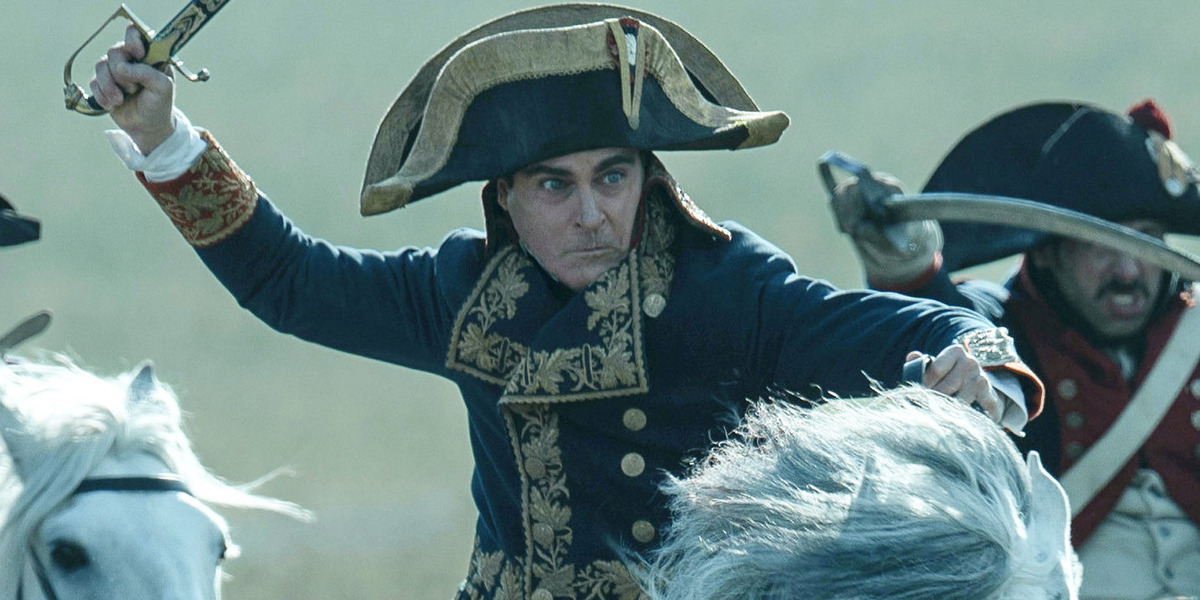Directed by Ridley Scott, ‘Napoleon’ (2023) is a historical drama movie starring Joaquin Phoenix in the titular role. The film follows the life of Napoleon Bonaparte. from his rise in the French military as a commander to becoming the French Emperor and eventual downfall. It also recreates several historical events, especially battles on a grand scale, along with an intimate look at Napoleon’s private life. As a result, it is natural for viewers to wonder what aspects of the film are based on historical facts and the true story of Napoleon and which parts are fabricated under creative liberty.
The Inspiration Behind Napoleon
‘Napoleon’ is largely inspired by a true story. The film is based on the life of French military commander and later emperor Napoleon Bonaparte. Born on August 15, 1769, Napoleon rose to prominence during the French Revolution. He was later crowned as the French Emperor in 1804, and his reign lasted for nearly a decade before he was forced to abdicate the throne in 1814 after losing to the Sixth Coalition. Following a brief exile, Napoleon retook control of France in March 1815, but his second reign only lasted a few months as he was defeated at the Battle of Waterloo in June 1815. Napoleon was exiled to Saint Helena island, where he died in 1821.

Napoleon remains one of history’s most renowned French military commanders but is also viewed as a divisive and controversial figure. The film aims to adapt the different facets of Napoleon’s life and the complexity behind the man who rose to be the king. As a result, the screenplay by David Scarpa also focuses on Napoleon’s relationship with Lady Josephine, aka Joséphine de Beauharnais. At the same time, the movie highlights Napoleon’s military and political acumen by covering 6 out of 81 battles he fought during his career. Among these six battles are The Siege of Toulon (1793), 13 Vendémiaire, the Battle of the Pyramids, the Battle of Austerlitz, and the Battle of Waterloo.
However, for director Ridley Scott, Napoleon’s military conquests were not the primary draw to the French Emperor’s story. Instead, Scott wanted to explore the correlation between Napoleon’s military ambitions and his complex romance with Lady Josephine. “Napoleon is a man I’ve always been fascinated by. He came out of nowhere to rule everything — but all the while, he was waging a romantic war with his adulterous wife, Josephine. He conquered the world to try to win her love, and when he couldn’t, he conquered it to destroy her and destroyed himself in the process,” Scott said, speaking with Deadline in 2021.
Screenwriter David Scarpa echoed the director’s sentiments while speaking to The New Yorker. Scarpa explained that while researching for the script, he could not categorize Napoleon as a hero or a villain like most other historical figures. Napoleon’s supposed ineptitude with women stuck with the writer, particularly his vulnerabilities, which were exposed through Lady Josephine. Scarpa stuck to the angle and pitched it to Scott, who was also on board with exploring Napoleon’s life through his vulnerability.
From Scarpa and Scott’s words, we can deduce that this take on Napoleon is more of a doomed romance with a military conquest backdrop showcasing the power struggle across Europe during the 17th century. Despite this, Scott did not shy away from maintaining historical accuracy in the movie. Scott worked with Michael Broers, a British historian and a Professor of Western European History at Oxford, to ensure the film’s historical accuracy. Broers advised Scott on several aspects of Napoleon’s life, including details of his battles and the motivations of his enemies and those closest to him.
Similarly, Scott also closely worked with the art and costume department to ensure the film captures the environment of the historical period when the story is set. However, the film has been criticized for certain historical inaccuracies, particularly regarding the timeline of certain events in Napoleon’s life. Some historians have highlighted events such as Napoleon attending Marie Antoinette’s execution, his troops shooting the pyramids in Egypt, and leading the charge of cavalry as historically inaccurate.
Moreover, other cosmetic details such as the casting of Joaquin Phoenix in the titular, who is supposedly taller than the French Ruler, the timing of the battles, and the costumes and hairstyles of other characters have been deemed historically inaccurate. Nonetheless, Scott was unphased by these discrepancies and admitted to taking some cinematic liberties when crafting certain real events and facts, citing the overall debate about Napoleon’s life among historians.
Ultimately, ‘Napoleon’ is indeed a historical drama based on the life of Napoleon Bonaparte. However, it is not exactly a biographical depiction of the former French Emperor. Instead, the film showcases Napoleon through director Ridley Scott’s lens, who interprets the historical figure as a ruthless military commander with a vulnerable side. As a result, ‘Napoleon’ sports some historical inaccuracies but is a compelling and lavish emotional drama accompanied by epic battles infused with realism.
Read More: Napoleon: All Shooting Locations


You must be logged in to post a comment.